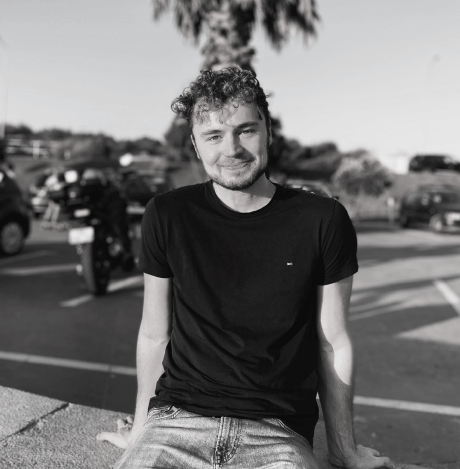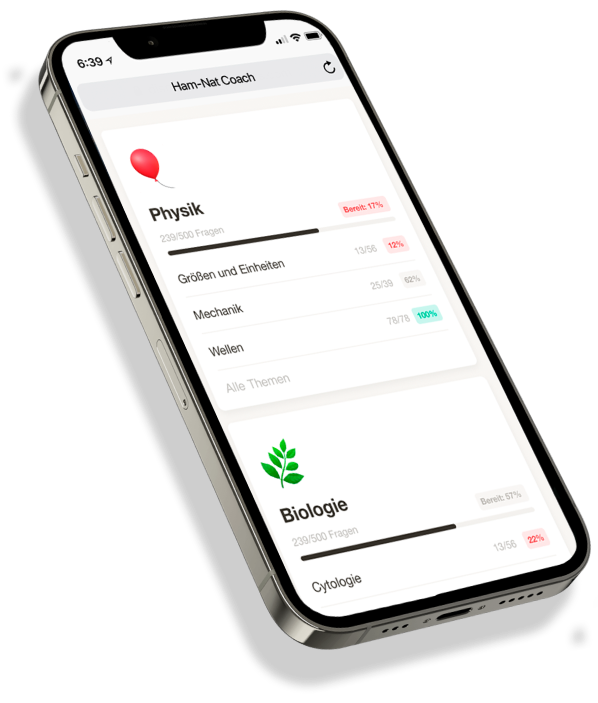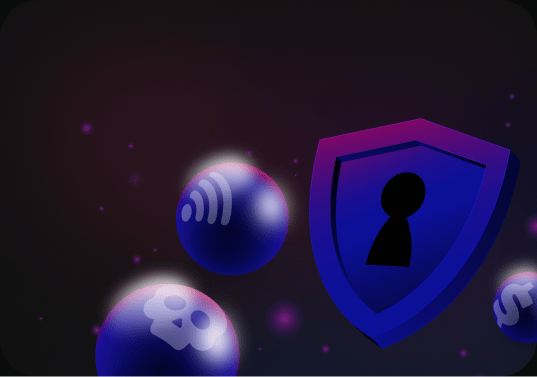Pascal Klein
Co-founder of Ham-Nat Coach

About how the idea was born, what values to adhere to, and plans for the future
Ham-nat
coach

Tjark Krüger
Co-founder of Ham-Nat Coach
HAM-Nat is a science test to enter several
medical universities in Germany.
Pascal Klein and Tjark Krüger are students that successfully passed this test themselves.
At that time, there were no decent sources to use for preparation — no books, not to mention e-learning platforms. That’s why, back in 2017, the two started an initiative to help others prepare for HAM-Nat. Together, they wrote student books and came up with their online platform, HAM-Nat Coach which is now used by hundreds of students every year.
It’s their own experience that helped Pascal and Tjark elicit the need and fill this gap in the German educational system - with a limited budget at the start.
Pascal, what are the things that inspired you to help students with HAM-Nat?
Pascal
It started as I myself prepared for the medical admission test. I’ll explain: in Germany, there are two ways to get into medical school. You
either get there with no exams if your grades are high enough or you pass the a dmission test if the grades are not that perfect. Mine weren’t,
so I had to study up.
At that time I realized there was nothing to help me prepare for HAM-Nat but books for students who already studied medicine. What I needed was just missing! My friend Tjark and I had to take the information here and there, and after we passed the test successfully, we decided to move ahead and fill this gap.
You and Tjark are co-founders. How were your roles distributed when you worked on the project?
Pascal
I was mainly responsible for building out communication with the Anadea dev team and for the ongoing connection. Tjark on the other hand was in charge of selling our books.

The importance of educational materials and methodology behind HAM-Nat Coach is undeniable. But still, what's the importance of the technical aspect in this kind of business?
Pascal
Well, the available technical improvements enable multitasking. For example, students spend a lot of time in the subway every day. And thanks to
our online platform, they can devote this time to studying and doing small things to get better. They can play small games and compete with each
other. Competition helps them realize where they are at that specific moment.
«Am I better than most of the students or am I the worst» they think, and that’s how they actually get motivated. It’s fun to compete when playing games because, in the end, everyone understands that only a specific percentage will get approved. What we offer is a good way to prepare for the actual test and get motivated wherever the students are.
How many people actually use your platform?
Pascal
I don’t have the exact numbers. It’s several thousand every year, I guess.

Successful education startups vs Universities
What about the actual state of educational services in Germany? How can you describe it?
Pascal
What comes to mind first is the state of official institutions. For example, I study at the university and I think the educational opportunities
with the technology are not used in full measure. What’s used is open-source solutions, like Moodle at our university. It’s not bad, but the problem
is that it's really difficult to scale and make something special with it.
We had the option to go just with Moodle but decided not to as we wanted to go our own way. Of course, developing something from scratch cost us
more, but in the end, we got what really stands out — our platform.
There’s nothing like HAM-Nat Coach in the market, and there’s so much we can do with it.
Let’s talk about the success of your project. Could you describe it from this point further?
Pascal
Right now our platform only covers HAM-Nat. Only a few big cities in Germany have this test, so our next step is preparing students for another kind of admission test. In other words, we scale up. We’ve spent the whole year getting everything done, and now we’re ready to launch our new program.
We plan to reach out to as many students as possible hoping they find value in what we do.
It requires top-quality materials, which is always our number one priority.
By the way, when we were talking about the educational market in Germany, we had a vision from your words that it's not very overcrowded. How did you position HAM-Nat Coach in the market? How did you make it visible to your target audience?
Pascal
We’ve focused a lot on building relationships with our customers. In the beginning, we were spending a lot of time every day just answering questions because we were the ones who passed the test successfully - people had a living example of how it was done and were interested in that.

At first, we offered our services for free. We didn’t say “you have to buy this, you have to buy that” — we just helped students as far as we could and didn’t expect them to buy access to the platform. Then we started our Facebook community, and later the books came out, of which there are 12 so far. We’re constantly improving and trying to be very close to our customers.

What values stand behind your project and have they changed somehow from the day you launched?
Pascal
We stick to our values — being closer to students and offering high-quality materials. However, such a basic thing like high quality was not
always like that. When we just launched, materials were not that great, they had mistakes and lacked attention to detail.
And that’s what Anadea helped us with. When we had some idea in mind, you always got in contact with us very quickly and gave us an overview of
how it could be implemented and fit our budget. You were so transparent about it, which we can’t help but appreciate.
When we started our project at the end of 2017, we didn’t have much money for it, but there were a lot of features we wanted in the platform. So I asked the Anadea team how we could do that with the amount we had. Somehow you immediately decided on what could be done and started to work with the budget not that large for a tech company. It was what we, students, managed to save up and could spend. And we made it work. Together.
What was your experience with the team while you were cooperating?
Pascal
It was actually very good. What stood out first was very fast answers — I was not quite used to that! The second thing is that you were always very transparent and open about what was possible within our budget. And the third is that you came with a very precise cost estimation - there could be just minor deviations, so I was really impressed.
We sought relevant expertise from education startups developers
How did you find us? What were the criteria for choosing us as a vendor company?
Pascal
I think at that time I googled something like “education platform programming”, as simple as that. I came up with a few websites that looked
promising, and Anadea’s was one of them.
I was checking and analyzing what you had, the projects you delivered for other companies before.
What I found is very good feedback from one of the previous clients, and I also liked the products — one in particular. It was that massive project
for Denmark’s educational institution, StavOnline.
Looking at the positive feedback, I thought, “let’s catch up, let's write them”.
Very quickly, a sales manager responded with an offer, and we had a short phone call. After that, I received a page full of questions on our idea to
answer. These questions helped us to shape the idea.
The questions opened new opportunities, new ideas, and I was really into it.
And I also noticed that ideas were born after I talked to the team of programmers.
Sometimes they had their questions and came up with concepts of how to implement something that we wanted. So there was an initiative on their part, too.
Can you give some advice for inspired startuppers? What would be your advice for you four years ago?
Pascal
You’ll need a unique style of a product and values that run through its whole concept.
Always stay true to the values you started with. Make them really clear to the customers and your team so that everyone knows what the company
is about and what its mission is.
I can give an example. One of our principles has always been to be close to the customer, right?
One of our principles has always been to be close to the customer
And recently we’ve had a new team member who’d like there to be less personal input but more outsourcing in our work. I myself can’t relate to that. Our target audience is students, so we definitely shouldn’t be too polished, too distant, blue-white, like a college. We want to preserve this personal connection with the students as Tjark and I have been there ourselves. So my advice is to stick to your values no matter what.
My advice is to stick to your values no matter what
How would you describe Anadea in just three words?
Pascal
That's actually a good question. I would say quality, then transparency, and speed.
Don’t forget about the students from abroad! They don't have many materials to prepare for admission tests in Germany, they really don’t. Maybe that could be your next step?
Pascal
I thought about it, and maybe this really could be our next option. Still, I’m not sure if many students from abroad are interested in German admission tests. There’s definitely a lot to take in, and I will, so thank you.
Right now, the German audience is our main focus. Since 2021, we’ve worked on Medcoaches.de, our project which helps prepare for TMS and EMS, tests recognized at most medical universities in Germany and Switzerland. In other words, we’re growing!
Don't dream of it, work for it!
Game-changing apps start here. Tell us about your project.
Send us your request for proposal, and we'll reply with the estimate.
Need more
inspiration?
Read more success stories









